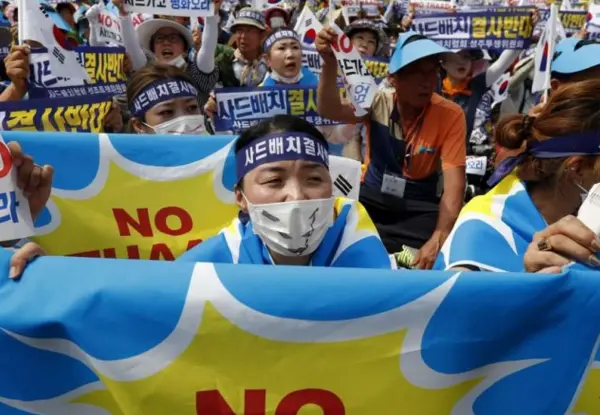South Korean President Park Geun-hye said on Thursday the move to deploy a THAAD missile defence system was “inevitable” because of a growing threat from DPRKand that division in the South over its deployment is what Pyongyang seeks.
DPRK’s launch of three ballistic missiles on Tuesday was the latest evidence that the anti-missile system is needed, Park said at a National Security Council meeting.
This month’s announcement by South Korea and the United States to deploy a Terminal High Altitude Area Defence (THAAD) unit with the US military in a rural melon-farming county in the South triggered loud protests from residents worried about possible negative health and environmental impacts.
Park Geun-hye:THAAD missile defence system was “inevitable”
“If we continue to be divisive and social confusion grows about a decision we had no choice but to make to protect the country and the lives of our people, it would be exactly where DPRKwants us to go,” Park said, according to her office.
DPRKsaid on Wednesday it had conducted a ballistic missile test that simulated pre-emptive strikes against South Korean ports and airfields used by the US military, likely referring to the three missiles fired on Tuesday.
South Korean President Park Geun-hye.Photo:AP
The missiles flew between 500km and 600km into the sea off its east coast and could have hit anywhere in South Korea if the North intended, the South’s military said.
Seongjuresidents: Hold a protest rallyon THAADin central Seoul
Many residents of Seongju, about 200km from the capital Seoul, joined by opposition members of parliament and civic groups, have demanded the government scrap the decision to site the THAAD battery there.
Thousands of Seongju residents were expected to hold a protest rally in central Seoul later on Thursday.
That follows a raucous stand-off last week between residents and the country’s prime minister, who was pelted with eggs and plastic bottles and trapped inside a bus for several hours when he visited the county to explain the THAAD decision. Some residents blamed outside leftist activists for the incident.
Thousands of Seongju residents were expected to hold a protest rally in central Seoul.Photo:SCMP
The THAAD's X-band radar is known to emit super-strong microwave detrimental to human body. It can also cause an environment hazard, boosting worries among villagers about the oriental melon farming, the economic mainstay of the Seongju county. Villagers returned home almost at midnight after the seven-hour protest.
Fury among villagers peaked on Friday when angry protesters threw water bottles and eggs at Prime Minister Hwang Kyo-ahn and Defense Minister Han Min-koo who visited the Seongju county to appease residents. Some shouted and another hurled abuses, while others violently tussled with security guards, according to TV footage.
The prime minister and other accompanying government officials were trapped for six and a half hours in a bus surrounded by about 3,000 villagers. The bus, in which Hwang sheltered, was made dirty by pelted eggs. The entrance to a parking lot was blocked by two tractors, driven by protesters.
China and Russia:Express strong objections to the THAAD installation
China and Russia have expressed strong objections to the THAAD installation in South Korea as the AN/TPY-2 radar can spot Chinese and Russian territories. Seoul has said it will adopt the terminal mode radar with a detectable range of 600-800 km, but it can be converted at any time into a forward-based mode, which can range at least 2,000 km.
China on Wednesday urged the United States and the Republic of Korea (ROK) to halt the the deployment of a U.S. anti-missile system in the ROK.
Earlier in the day, the ROK's defense ministry announced an agreement with the United States to deploy the U.S. missile defense system, called Terminal High Altitude Area Defense (THAAD), to its southeastern region despite continued opposition from neighboring countries.
The THAAD deployment would gravely damage the strategic balance in the region as well as the strategic security interests of countries in the region including China, Foreign Ministry spokesperson Lu Kang told a routine press briefing.
Deploying the Terminal High Altitude Area Defense (THAAD) on South Korean soil will negatively affect peace on the Korean Peninsula as well as regional and global security as it breaks strategic balance and boost arms race, experts here said Thursday.
(APD)
 简体中文
简体中文

